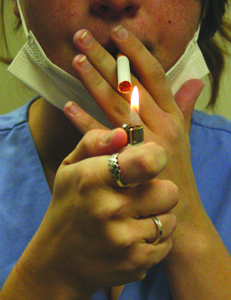By JESSICA MCCOY
 The days of smoke breaks for hospital employees are over. Hospitals across the country are instating a no-smoking requirement for all hopeful applicants, causing controversy for the smoking population.
The days of smoke breaks for hospital employees are over. Hospitals across the country are instating a no-smoking requirement for all hopeful applicants, causing controversy for the smoking population.
Florida Hospital Waterman in Tavares and Florida Hospital Fish Memorial in Orange City will no longer hire people who smoke, making a nicotine test part of the job requirement. They are also refusing to hire people who are using nicotine replacement products or electronic cigarettes to help them in the process of quitting.
This is discrimination. In a country that has fought for freedoms and civil rights, it is sad that our hospitals are succumbing to discrimination against possible employees. Smoking is a personal choice and something that one chooses to do in one’s own time. It is not fair that smokers are being discriminated against based on a lifestyle choice. This is like refusing to hire someone who has tattoos or body piercings that are hidden underneath appropriate clothing.
Hospitals perform a blood test to determine whether the applicant is a smoker or not. It is understandable that an employer would not want to hire smokers based on health factors. Yet employers do not conduct a full health check of all their employees. If health risks are the reason hospitals are refusing to hire these people what will we allow discrimination against next? The logical step would be to refuse employment to people with high cholesterol and an unhealthy diet. Refusing to hire smokers would be like refusing to hire an overweight applicant due to health risks.
Smoking cigarettes is legal. Smokers have the legal right to smoke as they so choose. Employees who do smoke would not be doing so at their place of employment or around their patients; therefore they would not be endangering any of their patients’ health or harming their well-being during their hospital stay.
Smoking cigarettes does not take away from the years of schooling a person would go through to work in a hospital. Smoking does not make a person any less qualified to do a job. For example, two applicants apply for a job at a hospital. Candidate A is highly qualified for the position and obviously the best candidate for the job but is a smoker, and candidate B is less qualified yet does not smoke. According to hospitals’ new hiring guidelines, candidate B would get the job. There is something wrong with this scenario.
According to the American Heart Association, in the United States, an estimated 25 million men and 21 million women smoke. This means hospitals are potentially refusing 46 million people a job.
Refusing to hire smokers is discrimination, and is penalizing qualified applicants. It is wrong of these hospitals to enforce this hiring restraint which, in turn, sends away qualified and willing applicants who want to save the lives of others while being employed at the desired hospital.